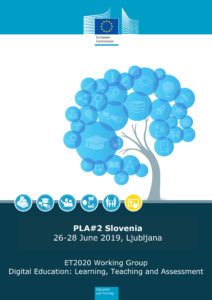 Workshop
Workshop
X5GON Co-design workshop
Artificial Intelligence and its implications for education.

ET2020 Working Group Digital Education: Learning, Teaching and Assessment, PLA#2 Slovenia 26-28 June 2019, Ljubljana
As part of the Education and Training 2020 (ET 2020) Open Method of Coordination, the Commission and Member States cooperate in the form of Working Groups.
The primary focus of the ET2020 Working Group on Digital Education: Learning, Teaching and Assessment (DELTA) is to benefit the Member States in the work of furthering policy development through mutual learning and the identification of good practices.
On this meeting we presented X5GON through the lenses of the 5Xs, and discussed and exchanged experiences and opinions on Artificial Intelligence and its implications for education.
The purpose of the PLA is to discuss and exchange experiences and opinions on Artificial Intelligence and its implications for education.
Artificial intelligence (AI) refers to machines or algorithms that are capable of observing their environment, learning, and based on the knowledge and experience gained, taking intelligent action or proposing decisions. AI covers a range of technologies, from an algorithm or app to machine learning and neural networks. AI contributes to simplify daily life tasks, offering great opportunities to individuals and across all sectors. For example, AI has the capacity to process huge data in a very short time, automate specific tasks and provide quickly requested information. Moreover, AI is significant for its profound impact on economy, future labour markets, competence requirements and consequently to education and teaching and learning practices.
AI in education can be used as a way to make learning more appealing for students, support existing capabilities and cognitive development and enhance student’s creativity and performance in advance tasks. Moreover, AI can be used for assessment and automate basic activities in education such as grading, as well as generating feedback and point out areas for improvement. Also, it can offer a more personalized and inclusive learning approach via intelligent tutoring systems or for example with tackling learning difficulties. However, there is still a considerable gap between the ‘hype’ of future potential and the reality of practice today.
Besides possible applications in education, as AI systems rapidly evolve, we are faced with a double competence gap: first, the need for all citizens to understand AI and its implications in their daily lives, and second, the need to train and prepare specialised AI professionals.
The objectives of the PLA are:
- Exploring emerging practices in AI developments for education;
- Sharing current initiatives or plans in different member states;
- Contribute to the EC coordinated plan on AI[1].
[1] In particular, contribute to this action: Explore how AI could be incorporated into the curricula of programmes for secondary and tertiary education, including vocational training. Commission will issue a report with the support of the Member States on this by early 2020 and support model actions in selected regions.










